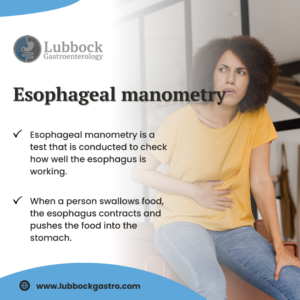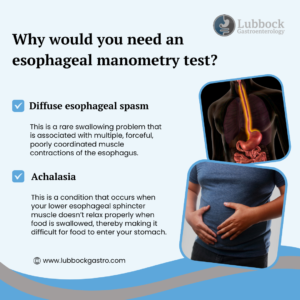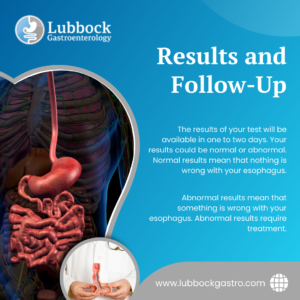Esophageal manometry Lubbock, Tx
If you’re experiencing problems with swallowing foods, it could be that your esophagus is not working properly. You may need to consult with your doctor for a proper diagnosis. Your doctor may order an Esophageal Manometry to know if your esophagus is working properly or not.
What is esophageal manometry?

Esophageal manometry Lubbock, Tx
Esophageal manometry is a test that is conducted to check how well the esophagus is working. When a person swallows food, the esophagus contracts and pushes the food into the stomach.
This test measures the contractions that occur when food is swallowed. The test also measures the force and coordination of esophageal sphincter when food is swallowed.
It measures how well the esophageal sphincter opens and closes, the pressure, mobility, and pattern of the esophageal sphincter contractions when food is swallowed and moves through the esophagus into the stomach.
Why would you need an esophageal manometry test?

Why would you need an esophageal manometry test
If you’re experiencing problems with swallowing or you’re experiencing symptoms that could be related to esophageal disorder, your doctor may recommend that you get this manometry.
Your doctor may order this test if you have difficulty swallowing or pain when swallowing.
This test can be used to help diagnose conditions such as:
Diffuse esophageal spasm
This is a rare swallowing problem that is associated with multiple, forceful, poorly coordinated muscle contractions of the esophagus.
It can be used as a diagnostic test for this condition.
Achalasia
This is a condition that occurs when your lower esophageal sphincter muscle doesn’t relax properly when food is swallowed, thereby making it difficult for food to enter your stomach.
It can lead to difficulty swallowing and regurgitation of food from your stomach into your throat.
Scleroderma
This is a condition that occurs when the muscles in the lower esophagus stop moving. This can lead to severe gastroesophageal reflux.
If you’re experiencing chest pain that is not related to your heart and the pain is not responding to treatment for gastroesophageal reflux, your doctor might recommend esophageal manometry.
Who is eligible for esophageal manometry?
You may be eligible for esophageal manometry if you have difficulty swallowing or pain when swallowing.
You may also be eligible for esophagus manometry if you have symptoms of GERD such as heartburn, regurgitation, chest pain and upper abdominal pain.
Preparing for Esophageal Manometry
Before undergoing the test, you will be asked not to eat or drink anything for a specific period of time.
Other specific instructions will be provided by your doctor before the test.
There are certain medications that you may be asked not to take before the test. You should inform your doctor about the medications that you’re currently taking.
What You Can Expect During and After Esophageal Manometry
Esophageal manometry is an outpatient procedure. You can go back home immediately after the test.
It can be performed using either conventional or high-resolution manometry.
It is best to use high-resolution manometry because it uses more pressure sensors and is more accurate at assessing pressure changes than the conventional manometry.
During the Test
The test doesn’t involve sedation or general anesthesia.
You will need to sit upright on a chair or exam table.
A numbing medication will be sprayed inside your throat or a numbing gel will be applied in your nose or both will be administered.
Your doctor will guide a catheter through your nose into your esophagus. The catheter is connected to a computer. The catheter doesn’t affect your breathing but you might experience some discomfort such as watery eyes and slight nosebleed.
When the catheter is in the right position, you’ll be asked to lie on your back or remain seated.
Your doctor will give you water to swallow in small sips. As you take small sips of water, the computer records the pressure, speed, and pattern of your esophageal muscle contractions.
You’ll also be asked to breathe slowly and smoothly while remaining very still and swallow only when instructed to.
Your doctor may move the catheter up or down into your stomach as the catheter continues taking records.
After the test is completed, the catheter is slowly withdrawn.
After the Test
The test is generally painless. Most people experience only minimal discomfort. You can go about your normal daily activities immediately after taking the test.
Results and Follow-Up

Results and Follow-Up
The results of your test will be available in one to two days. Your results could be normal or abnormal. Normal results mean that nothing is wrong with your esophagus.
It means that your esophagus muscles are working well. Abnormal results mean that something is wrong with your esophagus. Abnormal results require treatment.
The information from your results will help your doctor develop a treatment plan if there’s any problem. Your doctor will develop a treatment plan based on your results and follow-up until your esophagus is back to normal.
Will my esophageal manometry results lead me to the right treatment?
Yes. Esophageal manometry provides information about the functionality of your esophagus. With the information in your results, your doctor will know the right treatment for you.
A suitable treatment plan will be developed.
Difference Between Esophageal Manometry vs. Barium Swallow Test
Esophageal manometry test is used to check how well the esophagus is working. It measures the contractions that occur when food is swallowed.
The test also measures the force and coordination of esophageal sphincter when food is swallowed. It measures the pressure and constriction of the esophagus muscles as you swallow food and liquid.
It can detect and measure patterns of muscle contractions and activity within the esophagus.
A barium swallow test can be used to search for problems in the pharynx and esophagus. It is a special type of imaging test that uses barium and X-rays to create images of the upper gastrointestinal tract (pharynx and esophagus).
During the test, you will need to swallow barium while a series of X-rays will be taken as the barium moves through your throat and esophagus.
Barium swallow test helps to see the size and shape of the pharynx and esophagus more clearly. It is only used to search for problems in the pharynx and esophagus. It can’t measure patterns of muscle contractions in the esophagus.
FAQ
How uncomfortable is esophageal manometry?
Esophageal manometry is not painful. The procedure is well tolerated by most people. However, it can be a little uncomfortable, particularly when the catheter is driven through your nostril into the esophagus. A numbing agent is usually sprayed into your throat so that you don’t feel pain.
A numbing gel may also be applied to your nose to minimize pain and discomfort. After the test is completed, your throat may feel a little sore and there may be a little bleeding in your nose.
How long is esophageal manometry?
This test usually takes 30-45 minutes to be completed.
How accurate is esophageal manometry?
Esophageal manometry test is a highly accurate test. It provides accurate information about the functionality of the esophagus. Results from test showed that it has an accuracy of 87%.
What are the benefits of esophageal manometry?
- Esophageal manometry is primarily used to check if the esophagus is working properly or not.
- It can be used to check for problems related to swallowing disorders.
- It can be used to diagnose GERD, particularly if you’re experiencing symptoms of GERD such as heartburn, regurgitation, chest pain, or upper abdominal pain.
- It can also be used to diagnose conditions such as diffuse esophageal spasm, Achalasia, and Scleroderma.
- Results from test are used by doctors to develop a suitable treatment plan.
After esophageal manometry?
After undergoing test, your results will be out in one to two days. Your results could be normal or abnormal.
Normal results mean that nothing is wrong with your esophagus. Abnormal results mean that something is wrong with your esophagus.
Abnormal results require treatment. The information from your results will help your doctor develop a treatment plan.
Is esophageal manometry necessary?
Esophagus manometry is necessary if you’re experiencing difficulty swallowing foods or liquids.
It is also necessary if you’re experiencing symptoms of GERD such as heartburn, regurgitation, chest pain, or upper abdominal pain.
It is necessary if you have certain disorders of the esophagus such as diffuse esophageal spasm, Achalasia, and Scleroderma.
It helps your doctor to diagnose exactly what is wrong with your esophagus. The information from the test is used by your doctor to develop a treatment plan.
What happens if esophagus is not treated?
If a problem with the esophagus is not treated, it can get worse and make it very difficult or impossible for you to swallow food.
It can lead to severe complications such as narrowing of the esophagus, damage to the esophagus, and inability to swallow food and liquid, leading to loss of nutrients in the body, extreme weight loss, and severe dehydration.
How much does esophageal manometry cost in Lubbock?
The cost of esophageal manometry in Lubbock varies from provider to provider. The cost generally ranges from $500 to $1,500.
Can manometry diagnose GERD?
Esophageal manometry can be used in combination with other tests to diagnose GERD. It can be used in combination with PH monitoring to diagnose GERD.
Lubbock Gastroenterology: Best Gastroenterologist for Esophageal Manometry in Lubbock, Texas
A gastroenterologist is the right medical provider to seek for esophageal manometry in Lubbock, Texas. It is important that you get esophageal manometry test from a reputable gastroenterologist to ensure your safety and accurate results.
If you’re located in Lubbock or its environs, we recommend that you book an appointment with Dr. Sameer Islam, a reputable gastroenterologist in Lubbock, Texas.
Dr. Sameer Islam is the founder of Lubbock Gastroenterology. He is an extensively trained gastroenterologist and has been practicing for many years.
He conducts various tests that involve the gastrointestinal tract, including esophageal manometry test. He conducts this test using the most accurate method and safest technique.
Contact Dr. Sameer Islam today or Book an Appointment to get your esophageal manometry test done.
